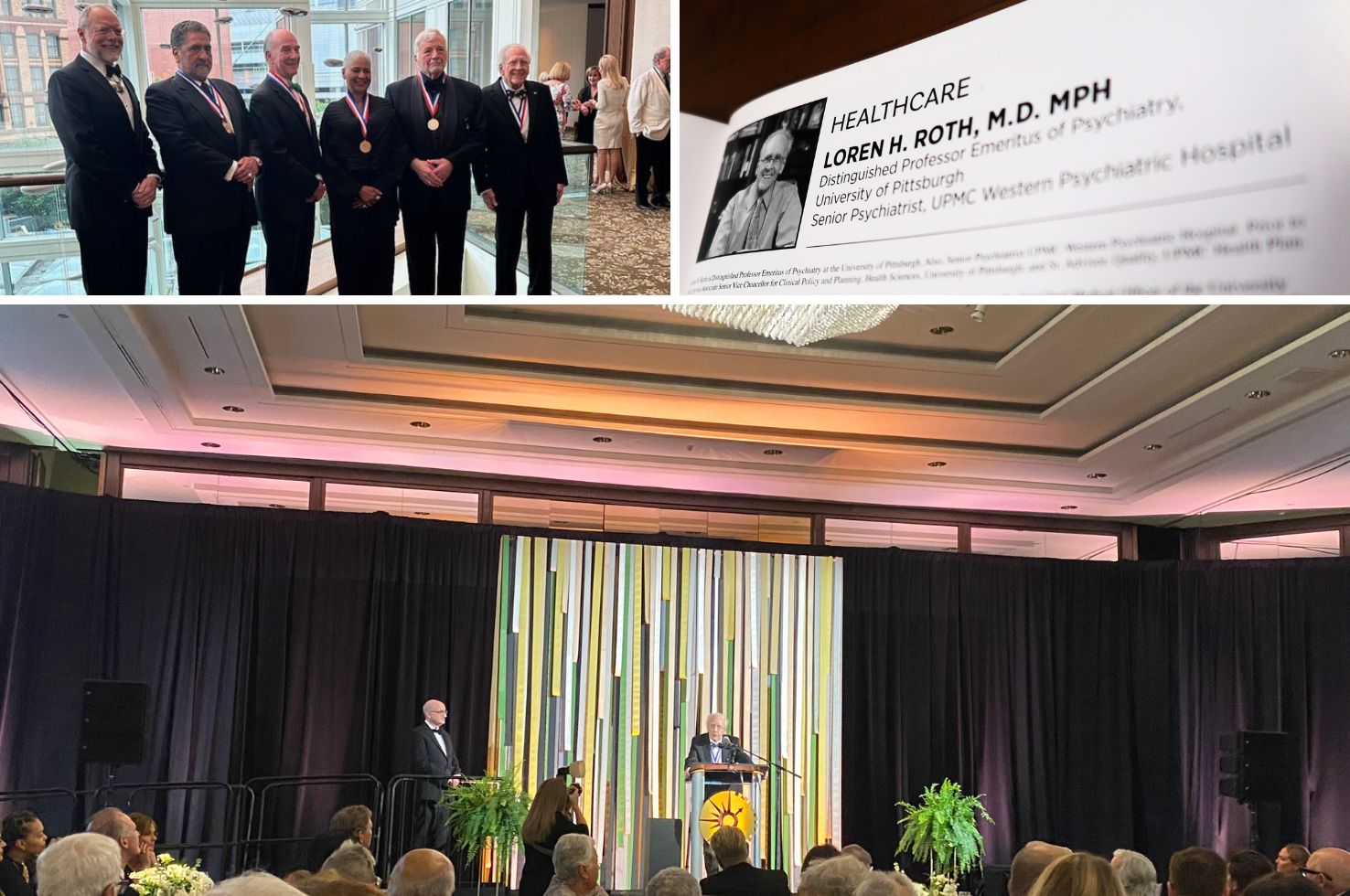Loren Roth, MD, MPH, Honored with Heinz History Maker in Healthcare Award

We are delighted to announce that Loren Roth, MD, MPH (Distinguished Professor Emeritus of Psychiatry) has received a Heinz History Center History Maker Award in the Healthcare category. The Heinz History Maker Awards recognize exceptional individuals with connections to Western Pennsylvania, whose accomplishments transcend geographic bounds.
Dr. Roth is well known for having played an instrumental role in developing the fruitful and complex partnership between the University of Pittsburgh and the University’s clinical partner, UPMC. This unique collaborative relationship, occurring during a period of rapid change in health care economics, insurance, and care delivery, is now a model for academic health care centers nationwide. During this period, Dr. Roth was also a major leader within UPMC to establish and develop the UPMC Health Plan and Community Care Behavioral Health Services, thus enlarging the scope and influence of UPMC to become an insurance provider. As such, UPMC is among the nation’s largest provider-owned insurance systems.
During his exceptional career, Dr. Roth has held numerous, highly influential leadership positions at the University of Pittsburgh and UPMC. At Pitt, he has served in roles including Associate Senior Vice Chancellor of Health Sciences and Associate Senior Vice Chancellor of Clinical Policy and Planning. For two decades, Dr. Roth led the UPMC Western Psychiatric Hospital (WPH) Law and Psychiatry Program. At UPMC, his roles have included Senior Vice President of Medical Services; Senior Vice President of Quality; Chief Medical Officer; Senior Advisor on Quality at the UPMC Health Plan; Chief of Adult Clinical Services at WPH; Chief of Clinical Services; and Chief of Psychiatry at UPMC Presbyterian Hospital. In recognition of his contributions as UPMC’s first Chief Medical Officer and his leadership in Quality and Safety matters, UPMC hosts an annual conference named for Dr. Roth, the Loren Roth UPMC Annual Quality and Safety Symposium.
Dr. Roth has demonstrated a profound commitment to patient advocacy that is evident through his conceptualization of effective medical student training, as well his national and international work. Dr. Roth is an expert on key law and psychiatry concepts, particularly informed consent in psychiatry. His work in this field was a major impetus to the formation of the MacArthur Foundation Program of Research on Mental Health and the Law—a productive and highly praised national collaborative established to develop new knowledge about the relationships between mental health and the law, and to apply that knowledge to the improvement of tools and criteria for evaluating patients. Dr. Roth’s participation in the MacArthur network resulted in a role as co-author of Rethinking Risk Assessment: The MacArthur Study of Mental Disorder and Violence, which the American Psychiatric Association honored with its Manfred S. Guttmacher Award.
Dr. Roth has additionally been a lifelong advocate and ally in advancing diversity, equity, and inclusivity at UPMC and Pitt. He helped establish and continues to be an influential leader in the Physician Inclusion Council at UPMC and Pitt (PICUP). This Council has played an essential role in helping to recruit, retain and develop physicians who are under-represented in medicine.
Upon receiving this honor at the 30th Annual History Makers Award Dinner, Dr. Roth—surrounded by family and multiple friends and colleagues—said, “Becoming a History Maker in Pittsburgh is the capstone of my long career. There are four institutions I wish to thank for giving me so many valued opportunities over my career: The University of Pittsburgh, its Department of Psychiatry, UPMC, and the UPMC Health Plan. These four organizations have created a widely admired academic health care system, virtually unique nationally in its purpose, scope, and modernity.
“History is the story of human nature. What could be more interesting or challenging? Why and how did I become a psychiatrist? During the Vietnam era, I joined the US Public Health Service and became a primary care physician at a maximum-security federal penitentiary in Lewisburg, Pennsylvania. My office was very near the stairs leading to what was then called ‘the hole,’ a euphemism for a prison within the prison. One day, I heard a terrifying noise. It was that of a disruptive inmate’s head bouncing down each stair as he was dragged to the hole. I was very upset at this inhumanity. I told the prison guards to stop; I knew I could handle this prisoner better in my own way. I met with the inmate several times to manage his aggressive behavior. He needed someone he might likely trust, someone who would listen to his side of the story. Subsequently, I wrote a paper on how to approach troublesome prison inmates for their own good. The National Institute of Mental Health included my concepts in its ‘interesting ideas’ abstracts. I decided to become a psychiatrist. When I applied to become a psychiatry resident at Yale, Dr. Thomas Detre told me he had never before received a recommendation letter from a warden.”
Please join us in congratulating Dr. Roth on this tremendous honor!
